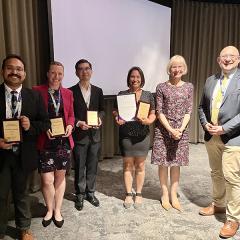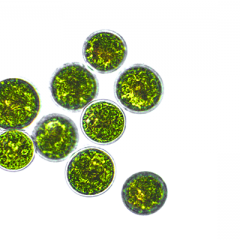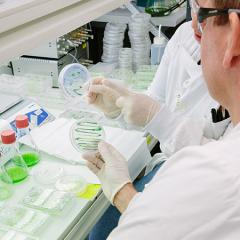Our vision is to transform global industries with solar-driven biotechnologies that secure planetary sustainability and resilience.
From Covid to Climate Change, the international community is faced with a series of tough health challenges that are tightly coupled to economic, social and environmental factors.
Covid 19 and evolving ‘superbug’ threats highlight the importance of robust industrial therapeutic production systems that can be rapidly scaled to meet emerging medical need at a cost accessible across all sectors of society from rich to poor.
In parallel, the increase in the intensity of Climate Change is threatening the food and water security for our expanding population, causing increased disease vector spread and impacting ecosystem security.
Our vision is to transform global industries with solar-driven biotechnologies that secure planetary sustainability and resilience. Our mission is to revolutionise the production of medicines, bio-medical products, foods, fuels, nano-materials and ecosystem services through bio-inspired solar-driven technology platforms.
These solar biotechnology platforms and industries are being designed to tap into the huge energy of the sun first to drive the production of high value pharmaceuticals (e.g. protein biologics, novel antibiotics, monoclonal antibodies), bio-actives (e.g. anti-microbials, anti-parasitics, anti-fungals, bio-herbicides) and medicated animal feeds, before expanding into the production of novel biopolymers and medical nanomaterials, foods, fuels and clean water to support global health. This ambitious and leading international program is made possible through carefully designed scientific and business innovation, and our strong multidisciplinary team.
Our team as part of the Centre for Solar Biotechnology contributes to linking the IMBs expertise in health to all five of UQ research impact themes.
Group leader

Professor Ben Hankamer
Group Leader, Bioinspired design of solar biotechnology systems
+61 7 334 62012
b.hankamer@imb.uq.edu.au
Centre for Solar Biotechnology
UQ Expert Profile
Vision
Transform global industries with solar-driven biotechnologies that secure planetary sustainability and resilience.
Mission
Revolutionise the production of medicines, bio-medical products, foods, fuels, nano-materials and ecosystem services through bio-inspired solar-driven technology platforms.
We have a welcoming, friendly and multi-lingual international research team that has to date supervised over 120 students from all over the world. Our close connections with our national and international research and industry partners provide students with access to a wide range of fundamental and applied science projects (see below for details of current opportunities). With ready access to the subtropical Australian coastline, Brisbane is a beautiful place to live and work. The IMB and Centre for Solar Biotechnology facilities offer an exceptional and supportive research environment for students to advance to their education and career and to connect with other research and industry partners.
The University of Queensland (UQ) provides an excellent research environment, being regularly ranked in the top 50 world universities, top 2-5 Australian Universities and ERA 5 in Biological Sciences, Plant Biology, Environmental Biotechnology, Environmental Engineering and Medical Health Sciences.
The Institute for Molecular Bioscience (UQ) is one of Australia’s premier research institutes providing a strongly supportive environment. The IMB is currently focusing on its core and emerging strengths through the development of a selected set of centres including the Centre for Solar Biotechnology.
The Centre for Solar Biotechnology (CSB), launched in May 2017, is an excellent research environment for this project as it has grown to include 30 international teams across Europe, the US and Australasia, with experience ranging from genome sequencing to demonstration-scale systems development. These CSB facilities include algae cultivation suites, molecular biology protocols (e.g. CRISPR, nuclear and chloroplast expression), robotic screening systems, flow cytometry, LCMS, advanced microscopy (laser light sheet and advanced cryo-electron microscopy), pharmaceutical and peptide chemistry, an advanced microalgae pilot plant (2, 10, 20, 200 and 2000L production systems) and sophisticated integrated Techno-Economic and Life Cycle Analysis capabilities.
- Microalgae cultivation lab with access to world class technologies/facilities
- Microalgae pilot plant with outdoor and indoor (PC2 certified) production facilities
- Molecular Biology: genetic engineering of the nuclear and chloroplast genome using cutting edge technologies (e.g. CRISPR) to produce robust production strains
- Protein expression pipeline from gene design to final product
- Structural Biology: Cryo-EM, Electron tomography
- Cryo-preservation
- Bioprocess engineering
- Technoeconomic analysis
- Life cycle analysis
Carrera-Pacheco, Saskya E., Hankamer, Ben and Oey, Melanie (2020). Light and heat-shock mediated TDA1 overexpression as a tool for controlled high-yield recombinant protein production in Chlamydomonas reinhardtii chloroplasts. Algal Research, 48 101921, 101921. doi: 10.1016/j.algal.2020.101921
Light guide systems enhance microalgae production efficiency in outdoor high rate ponds
Sivakaminathan, Shwetha, Wolf, Juliane, Yarnold, Jennifer, Roles, John, Ross, Ian L., Stephens, Evan, Henderson, Garry and Hankamer, Ben (2020). Light guide systems enhance microalgae production efficiency in outdoor high rate ponds. Algal Research, 47 101846, 101846. doi: 10.1016/j.algal.2020.101846
Musa, Mutah, Wolf, Juliane, Stephens, Evan, Hankamer, Ben, Brown, Richard and Rainey, Thomas J. (2020). Cationic polyacrylamide induced flocculation and turbulent dewatering of microalgae on a Britt Dynamic drainage jar. Separation and Purification Technology, 233 116004, 116004. doi: 10.1016/j.seppur.2019.116004
Charting a development path to deliver cost competitive microalgae-based fuels
Roles, John, Yarnold, Jennifer, Wolf, Juliane, Stephens, Evan, Hussey, Karen and Hankamer, Ben (2020). Charting a development path to deliver cost competitive microalgae-based fuels. Algal Research, 45 101721, 101721. doi: 10.1016/j.algal.2019.101721
Scholarship-funded PhD project available now
Optimising light-driven microalgae cell factories: Biochemical studies of Photosystem II mutants and their light harvesting systems
The sun is by far the largest renewable energy resource available to us, and every two hrs provides Earth with more energy than is required to power our entire global economy for a year.
This project will involve microalgal cell culture, light microscopy, purification of photosystem complexes by sucrose density gradient centrifugation and FPLC, biochemical and biophysical analyses of these complexes, negative stain and cryo-electron microscopy. They will also have the opportunity to use the state-of-the-art cryo-EM facilities to collect atomic resolution images for single particle analysis.
This project is supported by an Earmarked Scholarship.
Our approach
The Centre for Solar Biotechnology directed by Prof Hankamer connects ~ 30 international research teams (1/4 million citations) across Europe, US, Asia, Australia and New Zealand, and its industry partners (~30 to date) to accelerate the innovation, translation and commercialisation of new solar bio-technologies and industries based on photosynthetic cyanobacteria, green algae and plants. Our technologies tap into the huge energy resource of the sun, first to drive the production of high value protein biologics before expanding into other health related products including novel biopolymers and medical nanomaterials. Our team takes a multidisciplinary, multiscale approach as our solar biotechnology systems must be optimised across the full-scale range. For example, at the atomic resolution level, precise structure guided CRISPR engineering of the microalgae photosynthetic systems can double production efficiency; similarly, for certain applications optimised government policy settings can reduce product costs by 50% highlighting that optimisation across all scales is essential. To support the ambitious goal of designing and translating next generation solar biotechnologies, our research program is guided by integrated techno-economic and life cycle analysis to deliver solutions offering triple bottom line, economic, social and environmental benefits that support industrial capacity building.
Research areas
Cell Biology
- Bioprospecting of Australian native microalgae and cyanobacteria
Structural Biology
- Cryo-EM
- Single particle analysis
- Electron tomography
Molecular Biology
- Microalgal CRISPR-based engineering
- Microalgal nucleus and chloroplast engineering
- Microalgal recombinant protein production
Biotechnological production, downstream processing & automation
- High throughput bioprocess optimisation
- Microalgae production scale-up and automation (capacity: 20 – 2000L per vessel)
- Microalgae downstream processing and biorefinery optimisation
Mathematical modelling, Techno-Economics and Life Cycle Analysis
- Solar factories: Microalgae based bio-manufacture (e.g. protein biologics)
- Solar factories: Plant based bio-manufacture (e.g. protein biologics)
Demonstration scale systems design
- Solar factories: Microalgae based biomanufacture (e.g. protein biologics)
- Solar factories: Plant based biomanufacture (e.g. protein biologics)
Research Projects
Pages
Latest news
-
-
Ignite Innovation sparks wound healing algae
10 May 2022 -
Growing tomorrow’s pharma in algae
23 August 2021
General enquiries
+61 7 3346 2222
imb@imb.uq.edu.au
Media enquiries
IMB fully supports UQ's Reconciliation Action Plan and is implementing actions within our institute.
Support us
Donate to research
100% of donations go to the cause













